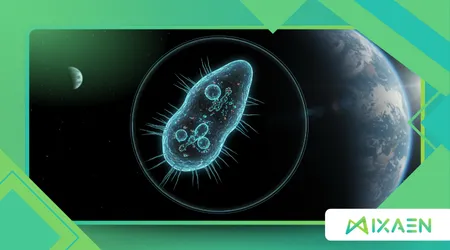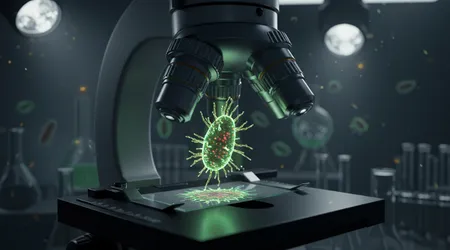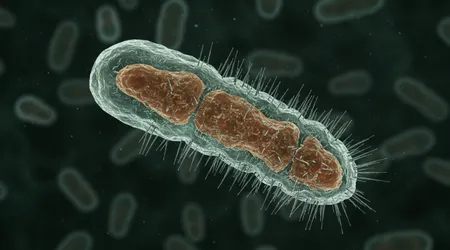What If the First Alien We Find Is Just a Microbe?

Imagine a groundbreaking moment in human history: the first alien we find is just a microbe. This scenario, far from the dramatic visions of extraterrestrial beings in science fiction, could reshape our understanding of life beyond Earth.
Anúncios
Astrobiology, the science dedicated to exploring life in the cosmos, has long speculated about the form alien life might take.
Recent advancements in planetary science and space exploration, particularly with missions to Mars and icy moons like Europa, suggest that microbial life could be our first encounter with the extraterrestrial.
This blog post dives into the implications of discovering a single-celled organism as our cosmic neighbor, exploring the scientific, philosophical, and cultural impacts of such a find.
Why might a microbe, rather than a complex being, be our first clue to life beyond Earth? Let’s embark on this journey through the stars, grounded in real science and vivid curiosity.
The possibility of finding microbial life captivates scientists and dreamers alike. Missions like NASA’s Perseverance rover, scouring Mars’ Jezero Crater since 2021, aim to uncover traces of ancient microbes.
Meanwhile, the upcoming Europa Clipper, set to launch in 2024 and arrive at Jupiter’s moon by 2030, will probe its subsurface ocean for signs of life.
These missions reflect a growing consensus: simple life forms are more likely to survive harsh extraterrestrial environments than complex organisms.
A microbe’s resilience, honed by billions of years of evolution, makes it a prime candidate for cosmic discovery.
This post will unravel why the first alien we find is just a microbe could redefine humanity’s place in the universe, blending cutting-edge research with thought-provoking questions.
The Science of Microbial Life in the Cosmos
The search for extraterrestrial life often focuses on microbes due to their adaptability. On Earth, extremophiles thrive in scalding vents and frozen deserts, hinting at possibilities elsewhere.
Mars, with its ancient lakebeds, may harbor fossilized microbes, as Perseverance’s samples could reveal. Europa’s icy crust hides a liquid ocean, potentially teeming with microbial life.
A 2021 study by Moissl-Eichinger et al. found Earth’s extremophiles rely on organic carbon, but inorganic nutrient users could exist on Mars, broadening our search criteria.
The first alien we find is just a microbe might thrive in conditions lethal to complex life, making them astrobiology’s prime target.
Consider the resilience of Earth’s microbes as a blueprint. Tardigrades, microscopic creatures, survive radiation and vacuum, conditions akin to space.
If similar organisms exist on Enceladus or Titan, they could be our first cosmic neighbors. The James Webb Space Telescope, operational since 2022, scans exoplanet atmospheres for biosignatures like methane, often produced by microbes.
++ The TRAPPIST-1 System: A Real-Life Sci-Fi Neighborhood
Detecting such gases could signal life without requiring complex forms. The first alien we find is just a microbe may not be a surprise but a logical outcome of life’s tenacity in extreme environments.
Scientific tools are evolving to detect these subtle signs. The Europa Clipper’s mass spectrometer will analyze plumes for organic molecules, while Mars’ rovers test soil chemistry.
These missions prioritize microbial evidence over intelligent life, reflecting a pragmatic approach. Microbes don’t need advanced ecosystems, only basic chemistry, making them more likely to persist across billions of years.
If the first alien we find is just a microbe, it could confirm that life is a universal phenomenon, not an Earthly anomaly, reshaping our cosmic perspective.

Philosophical Ripples of a Microbial Discovery
Discovering a microbe as the first alien we find is just a microbe would challenge our anthropocentric worldview. Humanity often imagines aliens as intelligent beings, but a single-celled organism would force us to rethink life’s definition.
Philosophers like Kant speculated about cosmic pluralism in the 18th century, yet microbes were barely understood then. Today, a microbial find would raise questions: Is life common but simple?
Does intelligence require rare conditions? Such a discovery might humble us, suggesting Earth’s complexity is an exception, not the rule.
Picture a lone microbe under a microscope, its alien biochemistry alienating yet familiar. This tiny entity could spark debates about life’s purpose.
Also read: Life on Super-Earths: Could We Survive There?
Unlike sentient aliens, microbes offer no dialogue, only existence. They’d challenge religious and existential frameworks, prompting us to ask: Are we alone in a universe of silent life?
The first alien we find is just a microbe might not answer Fermi’s paradox but could deepen it, suggesting life is abundant yet interaction elusive.
This discovery would also redefine “alien.” A microbe lacks culture or intent, yet its presence would confirm we’re not alone.
It’s like finding a single note in a cosmic symphony simple, yet profound. Philosophers might argue it elevates the value of all life, urging us to protect Earth’s ecosystems.
The ripple effects would touch ethics, science, and spirituality, making a microbe’s discovery a monumental event.
Cultural and Societal Impacts
The announcement that the first alien we find is just a microbe would ignite global fascination. Social media, especially platforms like X, would buzz with reactions, from awe to memes.
Unlike Hollywood’s alien invasions, a microbe wouldn’t threaten but intrigue. Museums might display models of alien cells, sparking public interest in astrobiology.
Schools could integrate exobiology into curricula, inspiring future scientists. The cultural shift would be subtle but pervasive, reframing our cosmic curiosity.
Imagine a news headline: “Microbe Found on Europa!” The public might initially feel underwhelmed, expecting little green men.
Read more: The Goldilocks Zone: Why It’s Not the Only Place Life Could Exist
Yet, science communicators could bridge this gap, explaining the find’s significance. Documentaries, like those on Netflix, might explore microbial life’s implications, drawing millions.
A 2024 survey by Pew Research showed 60% of Americans believe alien life exists, suggesting readiness for such news. The first alien we find is just a microbe could unite humanity in wonder, not fear.
Cultural narratives would evolve. Science fiction might pivot from interstellar wars to microbial mysteries, with stories exploring alien ecosystems.
Artists could depict microscopic aliens in vibrant detail, blending science and imagination. This discovery would also fuel debates on space exploration funding, as public enthusiasm grows.
It’s a chance to reimagine our place in the cosmos, with a microbe as the unlikely hero.
Technological and Exploratory Implications
Finding a microbe would accelerate space exploration. NASA’s Artemis program, aiming for lunar bases by 2030, could prioritize astrobiology missions.
The first alien we find is just a microbe would justify increased budgets for probes to Titan or Enceladus. Advanced rovers, equipped with AI-driven spectrometers, could hunt for biosignatures with precision.
This discovery would be a catalyst, proving life exists beyond Earth and spurring technological innovation.
Consider the analogy of a cosmic treasure hunt. Each microbe is a clue, guiding us to new worlds. The Europa Clipper’s 2024 launch exemplifies this quest, with instruments designed to detect organic compounds.
Future missions might deploy drones to explore Titan’s methane lakes or drill through Enceladus’ icy plumes. These technologies, born from microbial discoveries, could one day find complex life, building on this first step.
The table below outlines key missions targeting potential microbial life:
| Mission | Target | Launch Year | Objective |
|---|---|---|---|
| Perseverance Rover | Mars | 2020 | Search for ancient microbial fossils |
| Europa Clipper | Europa | 2024 | Analyze subsurface ocean biosignatures |
| Dragonfly | Titan | 2027 | Explore methane lakes for life signs |
This discovery would also refine SETI’s approach. Instead of radio signals, we’d prioritize chemical signatures, redirecting resources to spectroscopic tools.
The first alien we find is just a microbe could mark a new era of exploration, where small clues lead to grand discoveries.
The Future of Astrobiology Post-Discovery

A microbial find would redefine astrobiology’s trajectory. Scientists would intensify studies of exoplanet atmospheres, seeking gases like phosphine, a potential biosignature.
The first alien we find is just a microbe could confirm panspermia, the theory that life spreads via cosmic dust.
This would prompt missions to asteroids, testing for microbial hitchhikers. Astrobiology would shift from speculation to data-driven science, with microbes as the cornerstone.
Envision a lab analyzing an alien microbe’s DNA or its equivalent. Such a find could reveal universal biochemical principles, like amino acid reliance. It might also expose unique pathways, challenging Earth-centric models.
The James Webb Space Telescope’s 2025 data on exoplanet atmospheres could guide these studies, identifying habitable worlds. This discovery would fuel interdisciplinary research, merging biology, chemistry, and astronomy.
The future would also demand ethical considerations. Should we protect alien microbes or study them invasively?
International protocols, like those for Mars sample returns, would evolve. Public engagement would soar, with citizen science projects analyzing biosignature data.
The first alien we find is just a microbe could ignite a golden age of discovery, making astrobiology a household term.
Conclusion
The prospect that the first alien we find is just a microbe is both humbling and exhilarating. It challenges our dreams of meeting intelligent beings, yet opens a universe of possibilities.
From Mars’ dusty craters to Europa’s hidden oceans, microbes could be the first ambassadors of cosmic life. This discovery would ripple through science, philosophy, and culture, urging us to rethink our place among the stars.
As we stand on the cusp of such a find, with missions like Europa Clipper and Dragonfly pushing boundaries, the question lingers: What if a single cell holds the key to our cosmic story? Let’s embrace the wonder of the small, for it may lead us to the infinite.
Frequently Asked Questions
Q: How likely is it that the first alien life we find will be microbial?
A: Highly likely. Microbes are resilient, requiring only basic chemistry to survive, unlike complex life. Missions like Perseverance and Europa Clipper target microbial biosignatures.
Q: What would a microbial discovery mean for humanity?
A: It would confirm life beyond Earth, reshape philosophical views, boost space exploration, and inspire cultural shifts toward valuing all life forms.
Q: Could alien microbes pose a threat to Earth?
A: Unlikely. Alien microbes are adapted to foreign environments, not human bodies. Strict protocols, like those for Mars samples, would minimize risks.
Q: How would we detect alien microbes?
A: Through biosignatures like methane or phosphine, analyzed by rovers, probes, or telescopes like James Webb, focusing on habitable worlds’ atmospheres or surfaces.
